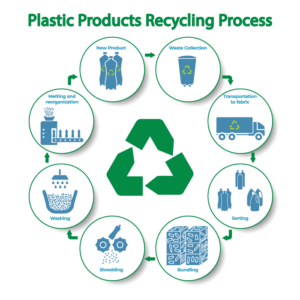100% RECYCLABLE, EVEN THE CAPS!
- BPA-FREE
- FREE SET-UP
- FREE DESIGN
- MADE IN MONTANA
- FAMILY OWNED
- 100% RECYCLABLE BOTTLES & CAPS
SUSTAINABILITY – SINGLE SERVE DOESN’T HAVE TO BE SINGLE USE!
Our sustainable water bottles are reusable & recyclable.
- Bottled water has the smallest water and energy footprint of any packaged beverage. In the bottled water industry, sustainability considerations must take place across the supply chain, from how water is sourced, to the material used in each bottle, to how packaging is collected & recycled.
- 100% Recyclable, even the caps!
- Plastics are extremely resource efficient. The bottled water industry manages resources responsibly by investing in technology and practices that improve water quality and conservation.
- In examining global warming potential, sticking with plastics over alternative packaging saves 75.8 million metric tons of CO2. This is equivalent to the greenhouse gas (GHG) emissions saved by taking almost 16 Million passenger vehicles off the road for a year.
- People who make the switch from sugar-laden packaged beverages to bottled water are helping the environment. Bottled water containers are 100% recyclable and use much less plastic than soda & other packaged beverages. Bottled water containers, on average, use 59% less PET plastic than other packaged beverages (9.89 grams vs. 23.9 grams for 16.9-ounce containers). Soft drinks and other sugary beverages need thicker plastic containers due to their carbonation and/or bottling processes.
- Bottled water is strictly regulated by the FDA. One of the simplest healthy lifestyle changes you can make is to drink water instead of sugar-sweetened beverages. Grab some sustainable water bottles from MT Private Reserve, brand them with your event or business brand, and start today!

SUSTAINABILITY – PLASTIC VS ALUMINUM
PLASTIC
- Bottled water has the smallest water and energy footprint of any packaged beverage. In the sustainable bottled water industry, sustainability considerations have to take place across the supply chain: from how water is sourced, to the material used in each bottle, to how packaging is collected and recycled.
- Though many think plastics are a detriment to the environment, the opposite is true. Many of the qualities that critics call environmentally negative, such as plastic’s resistance to corrosion and bio-inertness, make plastic resource efficient.
- Plastic packaging is also easily and frequently recycled.
- In 2018 alone, the United States recycled:
- Over 3 billion pounds of plastic bottles
- Over 1.2 billion pounds of non-bottle rigid plastic
- Over 1.1 billion pounds of the post-consumer film (including plastic bags and packaging)
- In examining global warming potential, plastics blow the other materials out of the water.
- Sticking with plastics over alternative packaging saves 75.8 million metric tons of CO2.
- This is equivalent to the greenhouse gas (GHG) emissions saved by taking almost 16 million passenger vehicles off the road for a year.
ALUMINUM
- Aluminum has a larger footprint in production because of the vast power needed in the smelting process.
- Production of each aluminum can pumps about twice as much. The mining of bauxite (Aluminum) is harsh on the planet.
- Miners extract raw bauxite by way of open pits, essentially scraping a pit into the landscape and leaving environmental destruction behind. Bauxite mining contributes to habitat loss, water contamination, and many other negative environmental impacts, like increased carbon erosion into the atmosphere as each plastic bottle.
- Although aluminum cans are recyclable, the Container Recycling Institute notes that approximately half of all aluminum cans end up in incinerators or landfills, resulting in additional cans made from new materials. Aluminum smelting gives off sulfur dioxide and nitrogen dioxide, which can result in both smog and acid rain.
- Bisphenol A, commonly referred to as “BPA,” is a toxic compound found within some plastics. Aluminum can manufacturers line the interior of the cans with a thin coating of plastic to prevent aluminum from leeching into the food. Unfortunately, one side effect of including a plastic lining in aluminum
cans is that consumers can be exposed to toxic levels of BPA. According to the Environmental Working Group, BPA exposure in lab animals caused cancer, infertility, miscarriages, polycystic ovarian disease, and insulin resistance–ailments the organization hypothesizes also could occur in people.
